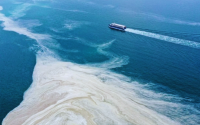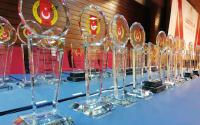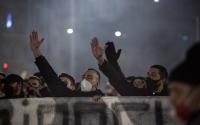3 February 2007Oliver Burkeman
This is how the world ends: not with a bang, nor with a whimper, but with a PowerPoint presentation.
The report of the Intergovernmental Panel on Climate Change, unveiled in the angular grey Unesco headquarters in Paris yesterday morning, was concise and to the point. But the graphs and charts projected on to a vast screen, above the heads of the assembled scientists, were more concise still. They showed how global temperatures have skyrocketed in recent decades, and how they would skyrocket further in the immediate future, and they brought the words "hell" and "handcart" to mind.
Every phrase in the report had been dissected, every sentence subjected to gruelling debate over several days, among 300 delegates representing 600 scientists and 113 countries, until everyone present concurred on every word. When the members of the IPCC agree on something, they really agree. You wouldn't want to have been there when they were deciding where to have dinner - but when they deliver what amounts to an imminent planetary death sentence, you're probably justified in feeling scared.
Naturally, the report came swaddled in the cautious language of science. But that couldn't smother the sense that a historic moment was unfolding. Perhaps it wasn't the first time the world's experts had declared the debate over the reality of manmade global warming was settled, once and for all, but it was certainly the most emphatic.
It would no longer be possible, you got the feeling, to be a climate-change denier and to present yourself as some kind of feisty maverick. From today onwards that position will be the exclusive preserve of the deluded and the breathtakingly cynical.
British delegate Phil Jones, the soft-spoken director of the Climatic Research Unit at the University of East Anglia in Norwich, wasn't feeling the sense of history just yet, however. "Mainly what I'm feeling is knackered," said Professor Jones. He had spent the last few days lobbying, successfully, for the use of the word "unequivocal" to describe the evidence that burning fossil fuels leads to global warming. "There was a lot of discussion about what that word meant in Spanish, and in French," he sighed. "You'd have thought we'd have got past all this by now."
Of course, the IPCC scientists, presenting their findings to hundreds of reporters and scores of TV cameras in the cavernous debating chamber, did indeed get past the human responsibility issue quite a long time ago. The really frightening part of their report was the conclusion that, if left unchecked, our current activities are likely to contribute to a rise of up to 6.4 degrees in world temperatures by the end of the century, unleashing catastrophic flooding, droughts and storms.
The world's media gamely tried to persuade the buttoned-up climate scientists to admit that they were worried sick, and to attack the inactivity of governments. They had no luck. "It's my personal scientific approach to say that it's not my role to communicate what should be done," said Susan Solomon, the American co-chair of the working group that produced the report. But the charts above her head spoke volumes.
It's a crucial part of the IPCC's balancing act, though, to avoid giving the impression that devastation is inevitable - that we might as well just throw up our hands and turn up the air-conditioning. The report, endorsed by every IPCC member state including the US, ought to be seen "not only as a milestone, but truly as a moment when the focus of attention will shift from whether climate change is linked to human activity, whether the science is sufficient, to what on earth we are going to do about it," insisted Achim Steiner, director of the UN Environment Programme. "We're looking for an unequivocal commitment from politicians, business leaders and civil society leaders to take climate change as truly the challenge of our century."
We already knew that this was a crisis of unprecedented proportions. But the ceremony of yesterday's proceedings mattered all the same. Apart from anything else, the gathering of so much scientific firepower in one place drew the attention of the American TV networks, which turned out in force.
A tipping-point of public awareness was being reached. The time for talking, as the politicians kept saying yesterday, was over. Now it was time for action.
Although in saying this they were, of course, still just talking.
http://environment.guardian.co.uk/print/0,,329705035-121568,00.html






